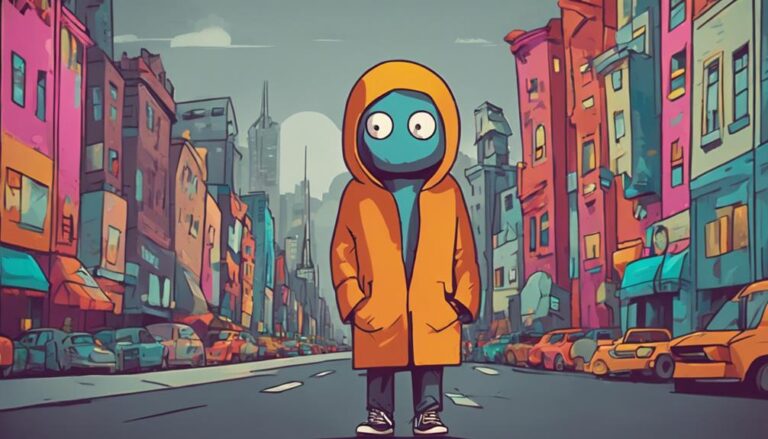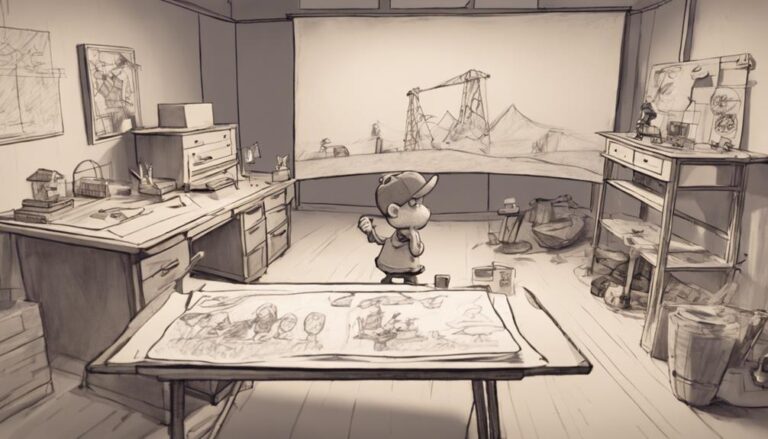Fun Animated Shows Teaching Kids About Science
As you navigate the world of kids' entertainment, you've likely stumbled upon animated shows that promise to teach science in a fun way. But do these shows really live up to their claims? Can they actually inspire a love of learning in your little ones? From exploring the human body to venturing into space, these programs use engaging storylines and colorful characters to break down complex concepts. But which shows are truly effective, and how can you choose the ones that will resonate with your kids?
Key Takeaways
- Engaging animated shows introduce science fundamentals like shapes, colors, and numbers to preschoolers through colorful characters and storylines.
- Shows like Sid the Science Kid and Wild Kratts teach physics, chemistry, and STEM concepts in a fun and accessible way for young minds.
- Animated series like Dinosaur Train and Walking with Dinosaurs bring dinosaurs and fossils to life, making learning about prehistoric creatures exciting and educational.
- Fun animated shows like The Magic School Bus teach kids about the human body, health, and nutrition through adventures and experiments.
Animated Science Shows for Preschoolers
Get your little ones excited about science with animated shows specifically designed for preschoolers, which use colorful characters and engaging storylines to introduce basic concepts like shapes, colors, and numbers.
These shows are perfect for curious minds, as they encourage children to ask questions and explore the world around them. By watching these shows, your preschoolers will develop essential skills like problem-solving, critical thinking, and creativity.
They'll also learn valuable lessons about friendship, teamwork, and empathy through the adventures of their new science friends.
One of the best things about these animated shows is that they make learning fun and interactive. Your kids will be singing along to catchy songs, playing games, and participating in fun experiments without even realizing they're learning.
As a parent, it's wonderful to see your child's face light up with excitement when they discover something new. So, sit back, relax, and let these animated shows do the work of inspiring your little ones to become curious, enthusiastic learners who love science.
Exploring the Human Body
As you explore the world of animated science shows, you'll discover that some of the most engaging and educational programs focus on the human body.
You'll learn how body systems work together seamlessly, like a well-oiled machine, and get a glimpse into the fascinating world of organs in action.
Body Systems Work
You're about to set out on a fascinating adventure that explores the intricate networks within you, where different body systems work together in harmony to keep you alive and thriving.
As you plunge into the world of body systems, you'll discover how each system relies on cell functions to perform specific tasks. For instance, the circulatory system transports oxygen and nutrients to cells, while the nervous system sends signals to cells to perform various functions.
| Body System | Functions |
|---|---|
| Circulatory System | Transports oxygen and nutrients to cells |
| Nervous System | Sends signals to cells to perform functions |
| Muscular System | Moves the body's skeleton and maintains posture |
| Skeletal System | Provides support and protection for the body |
| Integumentary System | Protects the body from external damage |
As you explore body mechanics, you'll learn how these systems work together to maintain homeostasis and keep your body running smoothly.
From the way your heart pumps blood to the way your brain processes information, each system plays a crucial role in keeping you alive and healthy.
Organs in Action
Now that you've grasped how body systems work together, let's dive deeper into the fascinating world of organs, where you'll discover how each one plays a pivotal role in keeping your body running smoothly.
In this animated adventure, you'll explore the heart, lungs, and other essential organs that make up the human body.
Heartbeats Explained: Did you know that your heart beats around 100,000 times a day? That's a lot of hard work! The heart is like a pump, pushing blood throughout your body, supplying oxygen and nutrients to your cells. Without it, you wouldn't be alive.
Lungs Functioning: Your lungs are like balloons that expand and deflate, bringing oxygen into your body and removing carbon dioxide. They work tirelessly to keep you breathing, even when you're not thinking about it.
These two organs work hand-in-hand to keep you alive and kicking. By learning about organs in action, you'll gain a deeper appreciation for the incredible machine that's your body.
Space Adventures for Kids
Through riveting storylines and lovable characters, animated space adventures are inspiring kids to explore the wonders of the universe and learn valuable science lessons along the way.
As you watch these shows with your kids, they'll set out on cosmic quests, make alien friends, and discover the magic of space exploration.
Stellar Storytelling: These shows weave together engaging narratives that spark kids' curiosity about the universe, from black holes to distant planets.
Fun Facts and Figures: Animated space adventures sneak in science lessons, teaching kids about astronomy, gravity, and the wonders of the cosmos.
Inspiring Imagination: By exploring the unknown, these shows encourage kids to think creatively, ask questions, and dream big about their own place in the universe.
Science in Everyday Life
As you watch your favorite animated shows, you might notice that science is all around you, even in the simplest things.
You're probably curious about how your favorite foods are made or how your body works, and that's exactly what we're going to explore.
From the chemistry of cooking to the wonders of nature and the basics of body health, let's discover how science affects your daily life.
Food and Cooking Chemistry
By whipping up a cake or scrambling eggs, you're unwittingly conducting chemistry experiments in your own kitchen, illustrating how food and cooking chemistry play a vital role in our daily lives.
The process of mixing, heating, and cooling ingredients involves chemical reactions that transform raw materials into delicious meals. Cake chemistry, for instance, involves the reaction of baking powder with liquid ingredients to produce carbon dioxide, causing the cake to rise.
Emulsification: Mayonnaise is a perfect example of emulsification, where oil and water mix together due to the presence of egg yolks.
Maillard Reaction: The browning of bread or searing of meat is a result of the Maillard reaction, a chemical reaction between amino acids and reducing sugars.
Gelation: Agar agar, a vegan alternative to gelatin, is derived from red algae and is used to create desserts like puddings and jellies.
Nature and the Environment
Take a step outside and you'll quickly realize that nature is full of fascinating scientific phenomena waiting to be explored, from the way water cycles through the environment to the incredible adaptations of the creatures that inhabit it.
As you scrutinize further, you'll discover the intricate web of relationships between living organisms and their habitats, and how they impact the ecosystem balance.
You'll learn about the importance of wildlife conservation, and how human actions can affect the delicate balance of nature.
Animated shows can bring these complex concepts to life, making them accessible and engaging for kids.
By watching these shows, kids can develop a deeper appreciation for the natural world and understand the role they play in preserving it.
They'll learn about the interconnectedness of species, habitats, and ecosystems, and how human actions can impact the environment.
In addition, they'll gain a sense of responsibility to protect and conserve natural resources, ensuring a sustainable future for generations to come.
Body and Health Basics
You're surrounded by a fascinating machine that never stops working – your body – which is made up of intricate systems that function together to keep you alive, healthy, and thriving.
As you grow and develop, understanding the basics is crucial to learn about how your body functions and how to take care of it. Animated shows can make learning about body and health basics fun and engaging for kids.
Shows can demonstrate the importance of regular exercise, balanced diets, and proper hygiene practices. By witnessing characters make healthy choices, kids can learn valuable habits to adopt in their own lives.
Animated series can explain complex concepts like growth and development, puberty, and emotional well-being in a way that's relatable and easy to understand.
Kids can learn about the different systems in the body, such as the circulatory, respiratory, and nervous systems, and how they work together to keep us alive and healthy.
Cartoons About Environmental Science
When it comes to teaching kids about environmental science, cartoons can be a great tool.
Environmental cartoons like Captain Planet and The Magic School Bus teach kids about the importance of preserving ecosystems and conserving natural resources. These shows make complex concepts fun and accessible, sparking kids' curiosity and desire to learn more.
As an Eco Warrior, you'll love shows like Wild Kratts, which takes kids on exciting adventures to explore different ecosystems and learn about the interconnectedness of species.
Meanwhile, Recycling Rulers will appreciate shows like Sid the Science Kid, which teaches kids about the impact of human actions on the environment and the importance of reducing, reusing, and recycling.
These shows empower kids to take action and make a positive impact on their communities. By watching these cartoons, you'll be inspired to become an environmental leader, making a difference in your own backyard and beyond.
Fun Physics and Chemistry Lessons
Now that you've explored the wonders of environmental science, get ready to uncover the fascinating world of physics and chemistry, where cartoons like Phineas and Ferb and The Magic School Bus make complex concepts like gravity, motion, and chemical reactions fun and easy to grasp.
These shows don't just entertain; they educate. You'll learn about:
Magnetic Forces: How they attract and repel objects, and how they're used in everyday life.
Energy Transfer: How energy changes forms, from kinetic to potential, and how it's harnessed in various ways.
Simple Machines: How levers, pulleys, and inclined planes make work easier and more efficient.
Through engaging storylines and relatable characters, these cartoons break down complex physics and chemistry concepts into bite-sized, easy-to-understand lessons. You'll find yourself laughing and learning alongside Phineas, Ferb, and Ms. Frizzle as they set out on wacky adventures and conduct cool experiments.
Shows About Dinosaurs and Fossils
How do animated shows like Dinosaur Train and Walking with Dinosaurs bring prehistoric creatures to life, making fossils and dinosaurs accessible and fascinating for young learners?
These shows take you on an exciting journey through time, exploring the world of dinosaurs and fossils in a way that's both entertaining and educational.
You'll join the Dino Dig team as they uncover hidden treasures and dig up dinosaur bones, or become a Fossil Hunter, searching for clues and piecing together the mysteries of the ancient past.
With their engaging storylines and lovable characters, these shows make complex concepts like fossilization and extinction easy to understand.
You'll learn about different types of dinosaurs, their habitats, and how they adapted to their environments.
By watching these shows, you'll develop a deeper appreciation for the natural world and the wonders that await discovery.
STEM Concepts Made Simple
Animated shows like Sid the Science Kid and Wild Kratts cleverly weave STEM concepts into their storylines, making abstract ideas like simple machines, gravity, and ecosystems fun and accessible for young minds. These shows don't just entertain; they educate, providing a solid foundation for future STEM learners.
Simple Machines: Shows like Cat in the Hat Knows a Lot About That! and Peg + Cat introduce kids to basic machines like levers, pulleys, and inclined planes, demonstrating how they're used in everyday life.
Coding Basics: Animated series like Codeybot and Botley teach kids the fundamentals of coding through fun, interactive storylines, encouraging problem-solving and logical thinking.
Engineering Principles: Wild Kratts and Octonauts showcase innovative solutions to real-world problems, inspiring kids to think creatively and develop essential engineering skills.
Frequently Asked Questions
Are Animated Science Shows Suitable for Kids With Learning Disabilities?
You're wondering if animated science shows are suitable for kids with learning disabilities. Absolutely! They offer accessibility benefits, such as visual aids and clear narration, while inclusive storytelling helps kids feel represented and valued.
Can These Shows Replace Traditional Classroom Teaching Methods?
You're wondering if virtual learning tools can replace traditional classroom methods. While they enhance interactive engagement, they shouldn't replace human teachers entirely, as personalized guidance and feedback are still essential for effective learning.
How Do I Choose the Right Show for My Child's Age Group?
When selecting a show for your child, consider their age and individual development, ensuring the content's age appropriateness. Research the target demographics to find a show that aligns with their interests and learning style.
Are There Any Animated Science Shows Available in Multiple Languages?
You're wondering if animated science shows break language barriers, right? Yes, many are available in multiple languages, ensuring global accessibility, so you can choose a show that resonates with your child's linguistic and cultural background.
Can Animated Science Shows Help Kids Develop Critical Thinking Skills?
You can boost your kid's science literacy by leveraging visual learning through animated shows, which encourage critical thinking skills by presenting complex concepts in an engaging, easy-to-understand format, making them more likely to ask questions and think critically.
Conclusion
You've just discovered a world of fun animated shows that make science an adventure for kids!
By watching these engaging programs, your little ones will develop a curiosity-driven mindset, essential skills, and a love for learning.
So, get ready to inspire the next generation of scientists, thinkers, and innovators.
With these shows, the wonders of science will come alive, sparking imagination, creativity, and a thirst for knowledge that will last a lifetime!






